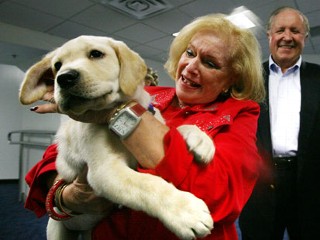Animal lovers Edgar,79 and Nina Otto,66 Labrador retriever, Lancelot, died of cancer which moved the couple to a cloned copy. On Jan. 27, 2009 a year after the demise Lancelot, their doggie double “Lancelot Encore.” arrived. And
he
looks
just
like
his
namesake.
 Picture: The 10-week-old golden Labrador retriever is a clone, created in South Korea by a California biotech firm from the DNA of the first Sir Lancelot, the beloved pet of Ed and Nina Otto of Boca Raton. The original ”Lancy” died, at age 11, in January 2008. In West Boca, Florida the couple on their 12-acre land, tend to four parrots, 10 cats and six sheep along with their nine other dogs. Edgar look upon Lancelot as an unbelievable, humanlike dog and a true companion. Hence the Ottos had DNA frozen from Lancelot six years ago(cryogenically
banked
DNA
samples). Then, last June — six months after Lance’s death — they bidded and won the dog-cloning auction for $155,000 held by the Northern California biotech firm BioArts International. BioArts partnered with Dr. Hwang S Woo-Suk, of the South Korea biotech research firm Sooam, to bring a second Lancelot into the Otto household. Hwang,
a
controversial
figure,
lost
his
research
professorship
at
Seoul
National
University
in
2004
after
fraudulently
claiming
that
he
had
cloned
human
embryos
and
stem cells. To
create
Lancelot
Encore,
Woo-suk
took
an
egg
from
what
Hawthorne
, who ran a BioArts predecessor called Genetic Savings & Clone, called
an
indigenous
Korean
dog
resembling
a
bloodhound,
replaced
the
egg's
innards
with
the
late
Lancelot's
DNA,
then
implanted
the
egg
in
a
second
Korean
dog.
Two
months
later,
Lancelot
Encore
was
born,
at
1.3
pounds.
Now
10
weeks old a
hefty,
boisterous
17
pounder,
he
lavished
kisses
on
the
Ottos
,
as
well
as
anyone
else
who
came
within
licking
range.
Picture: The 10-week-old golden Labrador retriever is a clone, created in South Korea by a California biotech firm from the DNA of the first Sir Lancelot, the beloved pet of Ed and Nina Otto of Boca Raton. The original ”Lancy” died, at age 11, in January 2008. In West Boca, Florida the couple on their 12-acre land, tend to four parrots, 10 cats and six sheep along with their nine other dogs. Edgar look upon Lancelot as an unbelievable, humanlike dog and a true companion. Hence the Ottos had DNA frozen from Lancelot six years ago(cryogenically
banked
DNA
samples). Then, last June — six months after Lance’s death — they bidded and won the dog-cloning auction for $155,000 held by the Northern California biotech firm BioArts International. BioArts partnered with Dr. Hwang S Woo-Suk, of the South Korea biotech research firm Sooam, to bring a second Lancelot into the Otto household. Hwang,
a
controversial
figure,
lost
his
research
professorship
at
Seoul
National
University
in
2004
after
fraudulently
claiming
that
he
had
cloned
human
embryos
and
stem cells. To
create
Lancelot
Encore,
Woo-suk
took
an
egg
from
what
Hawthorne
, who ran a BioArts predecessor called Genetic Savings & Clone, called
an
indigenous
Korean
dog
resembling
a
bloodhound,
replaced
the
egg's
innards
with
the
late
Lancelot's
DNA,
then
implanted
the
egg
in
a
second
Korean
dog.
Two
months
later,
Lancelot
Encore
was
born,
at
1.3
pounds.
Now
10
weeks old a
hefty,
boisterous
17
pounder,
he
lavished
kisses
on
the
Ottos
,
as
well
as
anyone
else
who
came
within
licking
range.
His
father,
the
late
Edward
Otto,
cofounded
both
NASCAR
and
the
Orange
Bowl
where,
in
the
1930s,
he
staged
motorcycle
races and Edgar himself started a successful medical company.  Ed Otto, NASCAR’s Silent Partner’ Book Launch Set for Daytona
Ed Otto, NASCAR’s Silent Partner’ Book Launch Set for Daytona
VIA
The Humane Society of the United States lambastes pet cloning calling the practice ”disreputable,” the animal-welfare organization insists that “cloning cannot replicate an animal’s uniqueness. Cloning can only replicate the pet’s genetics, which influence but do not determine his physical attributes or personality.” It is unclear whether little Lancy’s temperament will resemble his predecessor’s. The concept has critics, many of whom question the ethics of spending so much money on custom-designed dogs at a time when U.S. shelters kill an estimated 3 million to 4 million unwanted pets annually. The [Tri-County] Humane Society in Palm Beach County, no-kill shelter’s founder and CEO, Jeannette Christos said the Ottos have given her shelter almost twice what their new puppy cost.
This site requires Quick time to play its audio player if need.
----------------------------------------------
"A penny for your thoughts"
----------------------------------------------
"A penny for your thoughts"
You are here: Home > Reality > Couple spend $155,000 to clone dead dog
Monday, March 2, 2009
Couple spend $155,000 to clone dead dog
I'm reading: Couple spend $155,000 to clone dead dogTweet this!
Posted by
BigCloud
at
10:19 PM

Labels: Astounding, Reality | Hotlinks: DiggIt! Del.icio.us
Subscribe to:
Post Comments (Atom)







0 Comments:
Post a Comment